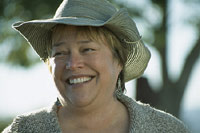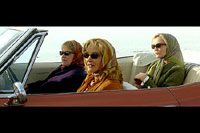The operative words are “Be Kind.”
Oh boy, a movie about a 1966 Bonneville convertible! That’s the car my sisters and I learned to drive on. Ours was silver with a black interior, purchased brand-new off the showroom floor with every possible extra. We called it the Batmobile. It’s in retirement at Louisa’s place now, but I like to think of it as resting up.
I went to see the cinematic Bonneville filled with hopeful nostalgia, but, I regret to say, it’s a really crummy movie. Though the car appears in the film, it’s mere eye candy for a story about three middle-aged women (“middle,” that is, if you know lots of 120-year-olds). They—Arvilla (Jessica Lange), Margene (Kathy Bates), and Carol (Joan Allen)—are using the spiffy vehicle to make a road trip from Pocatello, Idaho to Santa Barbara, California. Though road-trip movies have been overdone, it could still have been enjoyable, especially as a comedy retaining down-to-earth, wisecracking Bates. But Bonneville is also burdened with a serious plot element, one that feels contrived and manipulative.

It’s that Arvilla has just lost her husband, Joe. After his retirement, Joe became an adventurous traveler, and began taking Arvilla around the world. Death came while they were on a trip to Borneo. As the story opens we see Arvilla coming home in a taxi, clutching a container of Joe’s ashes. She had made him a promise to scatter them, the where and how left unspecified.
But Joe has a daughter from his first marriage, Francine, who feels strongly that he should be buried next to her mother, in the family plot in California. She offers Arvilla a deal: turn over the ashes by the time of the memorial service next week, and I won’t sell this house. (The house was left to Francine in a pre-Arvilla will, and in a theoretical later amendment that can’t be found.)
Since the unseen Joe looms large throughout the film, what kind of guy was he? Francine tells Arvilla that perhaps Joe never made a new will, since there were many things he said he’d do but never got around to, like moving to where he could be part of his grandchildren’s lives. Later we learn that Joe had programmed Arvilla’s phone so that a call from Francine would trigger the sound of a screaming raptor. Pretty hostile behavior, and there’s no obvious reason why Francine deserves it. Apparently she is Joe’s only child.

There’s also something creepy in the fact that Arvilla has placed his ashes in a pottery jar Joe purchased on one of his travels, one that had originally held the hearts of human sacrifices. Later, Margene recalls the time Joe gave her a gift of a shrunken head. My guess is that a shrunken head makes a hilarious gift only if it’s not Caucasian. If it were, it would be too obvious that you are holding the decapitated head of a young woman, say, or a child, or even an old man like Joe.
The film gives away this alternate view completely against its will. We are herded toward thinking that Francine must be in the wrong, because she’s uptight and wealthy. (How wealthy? One day we see her and her husband playing tennis next to the porch of their home; the next day, the view from the porch shows a swimming pool. Wow.) Her father is presented as her opposite, an adventurous free spirit who won’t be chained to the expectations of narrow, proper people.

Does that sound familiar? It’s the same narrative Baby Boomers internalized decades ago, when “narrow, proper people” meant their parents. Now that those foils are fast disappearing, Boomers are swinging around to paste the label on their children. (Another Jessica Lange film, Big Fish, preaches the same sermon.) Once a rebel, always a rebel, even if you have to invent someone to rebel against.
From the moment that Arvilla and her friends Margene and Carol hit the road, I knew exactly what was going to happen [SPOILER ALERT]: Arvilla would go ahead and scatter Joe’s ashes, and fool Francine by handing her a jar containing ashes of some other kind. I didn’t foresee exactly what those ashes would be, and it is a moment of piercing cruelty—if you see Francine as a real, grieving person, that is. But Bonneville is determined you’ll see things only from its jerry-rigged perspective.

Bonneville does have its bright points: Bates is operating in a different, more authentic universe than the rest of the cast, and provides some genuine laughs. The color scheme of the movie is consistently attractive, too, if unrealistic (when the women are in an autumn environment, they wear harmonizing outfits of orange, brown, and khaki green; when they’re at the beach, they’re all in white, beige, and light blue. And I sure don’t think the ’66 Bonneville came in burnt orange.) Joe’s ashes have gotten the Hollywood treatment, too. My husband, a pastor, has had occasion to deal with cremated remains (“cremains,” in the funeral industry’s cute little euphemism). What Arvilla keeps tenderly releasing to the wind is ashy and fine as dust; what you’d be more likely to see, on looking into the shoe-box-sized container, would be dried, pulverized bone, with some chips disconcertingly larger than others.
The visual center of the drama is Lange’s face, and unfortunately she’s had that thing done where the zone from eyebrows to cheekbones has been ironed out sideways with extra starch. You’d think any actor would especially prize and protect control of the myriad subtle muscles around the eyes, but this surgery pins everything back so tightly that the eyes look taut and masked. The rest of Lange’s still-lovely face is soft and believable, and it’s a shame she didn’t leave well enough alone. She’s an actress of substance, with two Oscars on her mantelpiece, and could have easily sold us on the beauty of a natural older face. This surgery doesn’t even deliver what it promises: it doesn’t make anybody look young, just weird.
Bonneville seems carefully constructed to get older women to come out to the movie theater, and self-consciously adorable “Red Hat” ladies will eat it up. They may be able to bring some men with them, with the car providing catnip for the guys the way Brad Pitt did for female viewers in Troy. For anybody else, the film is a bust. The ’66 Bonneville was a great car, but these talented ladies deserved a better vehicle.
Talk About It
Discussion starters- Have you ever visited a site from your childhood and found familiar landmarks gone or changed? What was different? What was the same? How did it make you feel? Did you think the changes were beneficial, harmful or neither?
- Why do we sometimes feel it is important that things stay the same, even if we know change is necessary or inevitable?
- At one point a character learns that something he always thought was true was a lie told to him since childhood. Is this lie like parents deceiving their children about Santa Claus or the Tooth Fairy? Is it unlike? What do you think of such deceptions? Are they harmless or wrong? Why?
- What do you think of Miss Falewicz’s line, “Our history belongs to us—we can change it if we want to”? What do you think she means by that? In what senses might someone want or try to change the past? Is it ever something we can do? If so, is it something that should or shouldn’t be done?
- Did you notice the Last Supper painting seen on Mr. Fletcher’s wall in a key scene? What if anything do you think it signifies?
The Family Corner
For parents to considerBonneville is rated PG for some mild language and innuendo. There’s no sex, violence, or bad language. Intergenerational family conflict forms the basis of the plot.
Photos © Copyright SenArt
Copyright © 2008 Christianity Today. Click for reprint information.












